Egyptian choice: between military secularism and religious fundamentalism
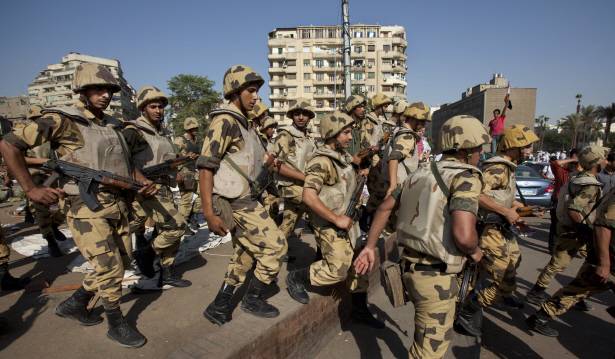
Recall that the postwar political story Egypt is, to a large extent, a story of confrontation between supporters of secular and religious statehood. As in Turkey, the armed forces in Egypt have become the forerunner of a secular society and remain so, despite the significant influence of religious fundamentalists, up to the present. However, this is where the similarity of the Egyptian and Turkish models ends. Turkey is a much more developed state, and most importantly - in this country there is a fairly large middle class, accustomed to the modern way of life, educated, oriented towards modernist values. In Egypt, there is no such large social stratum, but there is an elite and there is a large population living in poverty or even in complete poverty. It is the multimillion masses of the poor and poor Egyptians that are the main social base of religious fundamentalists, although the leaders of the latter, of course, also mostly come from the elite, more precisely, from its particular stratum, religious and intellectual environment.
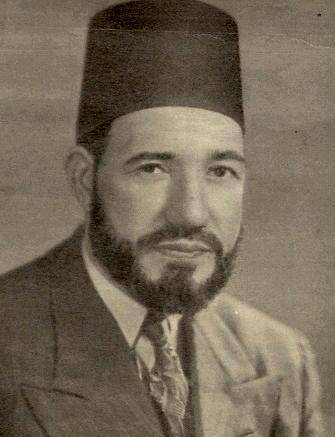 Religious fundamentalism originated in Egypt as a “counterweight” to the Ottoman imperial ideology and saw the return of traditional Islamic values as the only acceptable way to develop Egyptian society after the liberation of the Ottoman Empire. Subsequently, religious fundamentalists became the main opponents of secular Arab nationalists, who established themselves in power in Egypt after the revolution that overthrew the monarchy. Back in 1920's Egypt began the process of consolidating supporters of fundamentalist religious views. The Muslim Brotherhood organization (banned in the Russian Federation) was established at 1928, with Hassan ibn Ahmad al-Bann (1906-1949) at its head, working as a teacher in a school open to workers who worked on the Suez Canal. The activities of the Muslim Brotherhood soon spread to all of Egypt, and then they gained supporters in Palestine and Syria.
Religious fundamentalism originated in Egypt as a “counterweight” to the Ottoman imperial ideology and saw the return of traditional Islamic values as the only acceptable way to develop Egyptian society after the liberation of the Ottoman Empire. Subsequently, religious fundamentalists became the main opponents of secular Arab nationalists, who established themselves in power in Egypt after the revolution that overthrew the monarchy. Back in 1920's Egypt began the process of consolidating supporters of fundamentalist religious views. The Muslim Brotherhood organization (banned in the Russian Federation) was established at 1928, with Hassan ibn Ahmad al-Bann (1906-1949) at its head, working as a teacher in a school open to workers who worked on the Suez Canal. The activities of the Muslim Brotherhood soon spread to all of Egypt, and then they gained supporters in Palestine and Syria. Thirteen years after its creation, in 1941, BM already had more than 60 thousands of active members, and by 1948 the ranks of the Brotherhood increased to 500 thousands of members. It was an incredible success. "Muslim Brotherhood" actually turned into a "state within a state." They created their own schools and hospitals, provided their supporters with work, penetrated into the army and the state apparatus. In 1948, Prime Minister Mahmoud Fami al-Nakrashi issued a decree banning fraternity activities, after which in December 1948 was killed by supporters of this organization. 12 February 1949, in Cairo, was shot dead by Hasan al-Bann. His killer was never found. These events opened up a nearly seventy-year history of open opposition to the country's largest religious and political organization and the Egyptian state.
In 1950, the philosopher Seyid Ibrahim Qutb (1906-1966), who was not a political marginal, became the actual leader of BM. A well-educated man who served at one time as an inspector of the Ministry of Education, Qutb criticized the Western way of life and was a categorical opponent of his borrowing and distribution in Egypt. Already in 1954, the BM activity in Egypt was banned. In 1966, Qutb was sentenced to death. He was charged with involvement in the assassination of Egyptian President Gamal Abdel Nasser. By the way, the latter was the most decisive opponent of BM. During the years of his rule, large-scale repression was launched against the supporters of this organization. They continued after the change of power in the country. Anwar Sadat, who changed his policy from pro-Soviet to pro-American, was as negatively disposed towards BM as Nasser. He saw them as dangerous competitors in the struggle for power. Although BM was considered for some time as a counterweight to the Egyptian communist movement, in the end, Sadat also stepped up the persecution of members of this organization.
The Muslim Brotherhood and other Egyptian radical organizations were very unhappy with Sadat’s pro-American policy, especially after he began to normalize Egyptian-Israeli relations. The negative attitude towards the president’s domestic and foreign policy was the main reason for organizing his assassination at a military parade in 1981. The replaced Sadat Hosni Mubarak seriously strengthened the country's internal security system. Considering that Sadat was killed by a group of servicemen sympathizing with BM, Mubarak paid special attention to the fight against radical views in the armed forces. Mubarak’s policy was reasonably thought out. On the one hand, he softened the state’s line on the opposition by releasing a number of opposition politicians from prisons, but on the other hand he tightened the regime for fundamentalists, executing a number of members of fundamentalist organizations.
For this, Mubarak thirty-five years ago, in 1982, was sentenced to death. But the radicals did not succeed in killing him. Mubarak retained the presidency of the country for thirty years. Only the Arab Spring put an end to the Mubarak regime. Egypt has become one of those countries in the Arab world where the heat of protests has reached the highest temperature. As a result of mass protests in Cairo, Alexandria and other cities of the country, Mubarak was forced to abandon the post of head of state. But the authorities were able to retain the representatives of the military elite - the Supreme Council of the Armed Forces, headed by Field Marshal Mohammed Hussein Tantawi (born 1935), who served as Minister of Defense and Military Industry of Egypt since 1991. 30 June 2012 was won by the candidate of religious and political circles, the chairman of the Party of Freedom and Justice Mohammed Mursi, who was in fact one of the actual leaders of the Muslim Brotherhood, in the presidential elections announced in the country. His victory was evidence of the real popularity that the Muslim Brotherhood enjoyed in the country. Mursi's candidacy was supported by the most numerous part of the population - conservative-minded villagers.
However, almost immediately after coming to power, Mursi faced a serious opposition. She expressed the interests of the most well-to-do strata of Egyptian society - the officer corps of the army, urban intelligentsia, businessmen connected with foreign supplies and the tourist business. All these groups of people were extremely unprofitable coming to power in the country fundamentalists. All hope remained for the armed forces, whose officers received education in Great Britain and the United States and were much more positive about Western culture than the masses of rural residents.
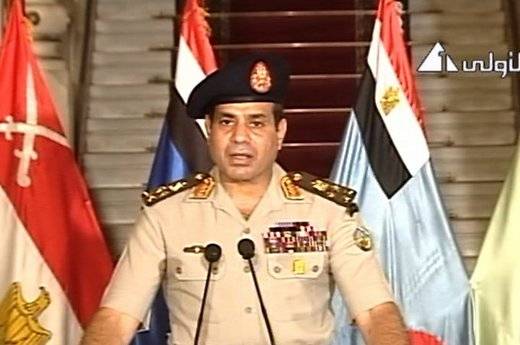
3 July 2013, Egyptian Defense Minister Abdul Fattah Al-Sisi announced the overthrow of President Mohammed Mursi. The military opposed the numerous demonstrators who supported Mursi, and even went to the use of weapons. At least about 300 of the leading Muslim Brotherhood activists were arrested. At the end of May, 2014 held a new presidential election in Egypt, which was expected to be won by Abdul Fattah Al-Sisi. Despite the fact that Sisi overthrew the president of the BM, he also met with the support of the general population. Despite the secularism of the officer elite, the attitude to the army in Egypt is especially reverent. In this country, again, similar to Turkey. In addition, they expected Sisi to be able to bring Egypt out of a severe economic crisis. He was supported by all those groups that once supported Gamal Abdel Nasser.
For USA and the West, Sisi's victory was not joyful. news. Despite the fact that the Secretary of Defense received military education in the United States and Great Britain, he again revived in the eyes of the West the ruined image of Arab secular nationalism. In domestic policy, Sisi followed the example of his predecessors Nasser, Sadat and Mubarak. He banned the activities of the majority of opposition political and religious organizations, carried out mass arrests of citizens suspected of collaborating with radicals. However, instead of a real improvement in political stability in the country, these measures led to a real wave of terror. In Egypt, began regular terrorist attacks against the security forces, the state apparatus, religious minorities. Egyptian Christians suffer the most from terrorist activities. It is the largest and oldest religious minority in the country. During the secular political regimes, Egyptian Christians - the Copts, Orthodox, Catholics - felt quite calm, because Arab nationalism did not imply discrimination of other Arabs on religious grounds (recall that Christians were Arabs at the source of many Middle Eastern secular nationalist organizations, for example, one of the founders The party of the Arab Socialist Revival "BAAS" was an Orthodox Christian Michel Aflyak). However, in 2011, after the overthrow of Mubarak, the position of the Copts and other Christians of Egypt turned out to be very dangerous. Many Christians were forced to emigrate from the country, others live in constant fear for fear of terrorist acts.
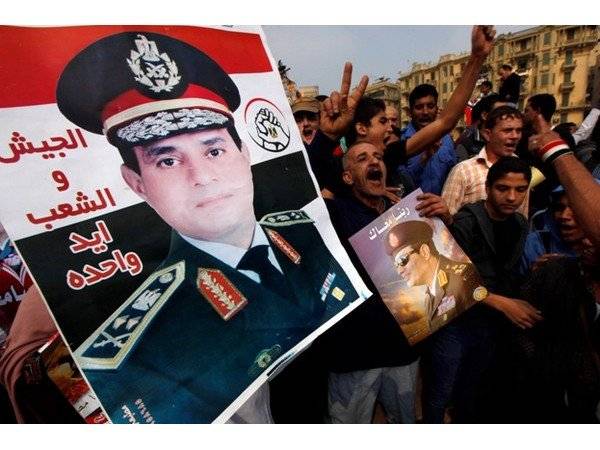
The intensification of the activity of the “Islamic state” (prohibited in the Russian Federation) in Syria and Iraq, as well as in neighboring Libya, contributed to a sharp intensification of radical groups. Of course, many Egyptians took part in the fighting as volunteers, on the other hand foreign fighters continued to penetrate into Egypt. The main recruitment of supporters took place in the prisons of Egypt, where thousands of young people were arrested for participating in demonstrations and protests. To prevent the propaganda activities of religious fundamentalists, Sisi forbade imams who do not have a special registration to give sermons. Those turned out to be about 12 thousand people.
However, even these measures could not affect the activity of the Muslim Brotherhood. Firstly, in Egypt, BM have long been operating not so much through religious institutions, as through schools, universities, and even hospitals. BM has a large and extensive network of followers, integrated public organizations and foundations, groups and circles, to destroy or to close which are simply not in the forces of the modern Egyptian state. Secondly, the level of social stratification in Egypt is such that the multimillion-dollar deprived masses will still adhere to the protest ideology, especially if it is based on the religious tenets that they understand and accept. As practice has shown, the tightening of police measures did not entail a major improvement in the situation in the country. The path of confrontation turned out to be wrong and split the Egyptian society. Moreover, Egypt is not a European country where it is possible to cope with a few radical organizations by means of police prosecution. BM is a serious force, not only politically, but also socially, in addition to all supported by solid assistance from foreign foundations.
As practice shows, in the countries of the Middle East and North Africa, the usual institutions of Western democracy, formed in completely different cultural conditions, bring to power religious and conservative forces. That is, just those political organizations that criticize the West, Western democracy and the Western way of life. The rule of "pro-Western" liberals in such countries is impossible. The only alternative to religious radicals is only the military dictatorships of secular nationalists, which were, strictly speaking, the regimes of Saddam Hussein, Muammar Gaddafi and Hosni Mubarak. However, the question is how much in the complex political situation of the modern world the model of secular nationalism in the Middle East will be able to remain attractive to wide sections of the population. In Egypt, at least, the conflict of the two models has already led to a serious internal confrontation, in fact - to a sluggish civil war, which has taken the form of terrorist acts. Whether as-Sisi succeeds in coping with his opponents, time will tell, but one thing remains clear - the number of human victims and the destructiveness of terrorist acts have not yet decreased, and this is very regrettable.
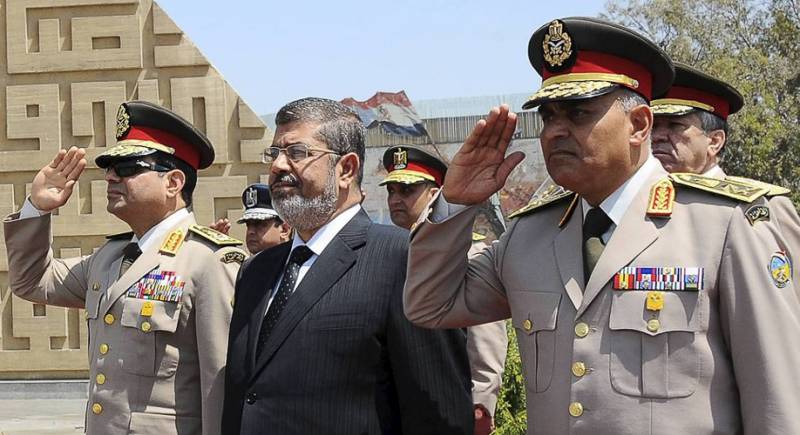
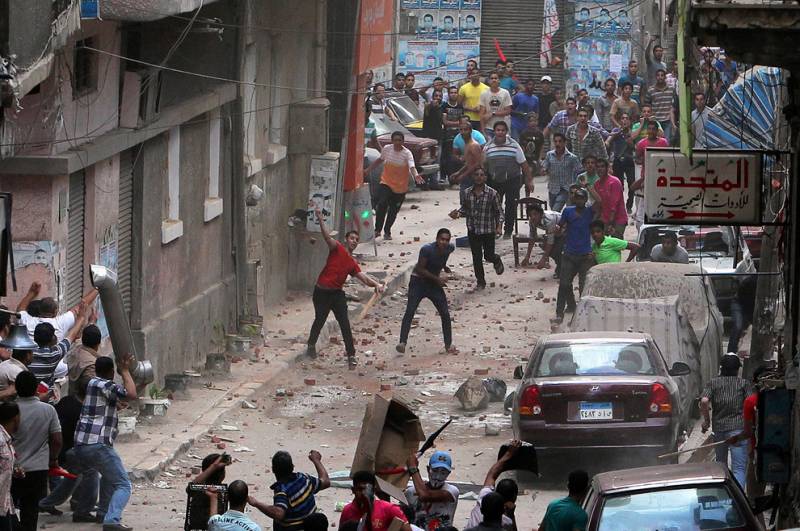
Information